‘This is not my home’: One family’s quest to overcome a hurtful international adoption
As the airplane carried him toward his homeland, 17-year-old Charles Gerth slouched in his seat, headphones pressed to his ears, a smile curling his lips.
The woman who had been his mother for the past six years shifted anxiously beside him, her mind racing. Am I doing the right thing? Does Charles really understand the choice he’s making? Does he know what he’ll be giving up?
Because, while two people were on their way to Uganda, only one would be flying back to the United States. The bonds of one family would break as those of another healed.
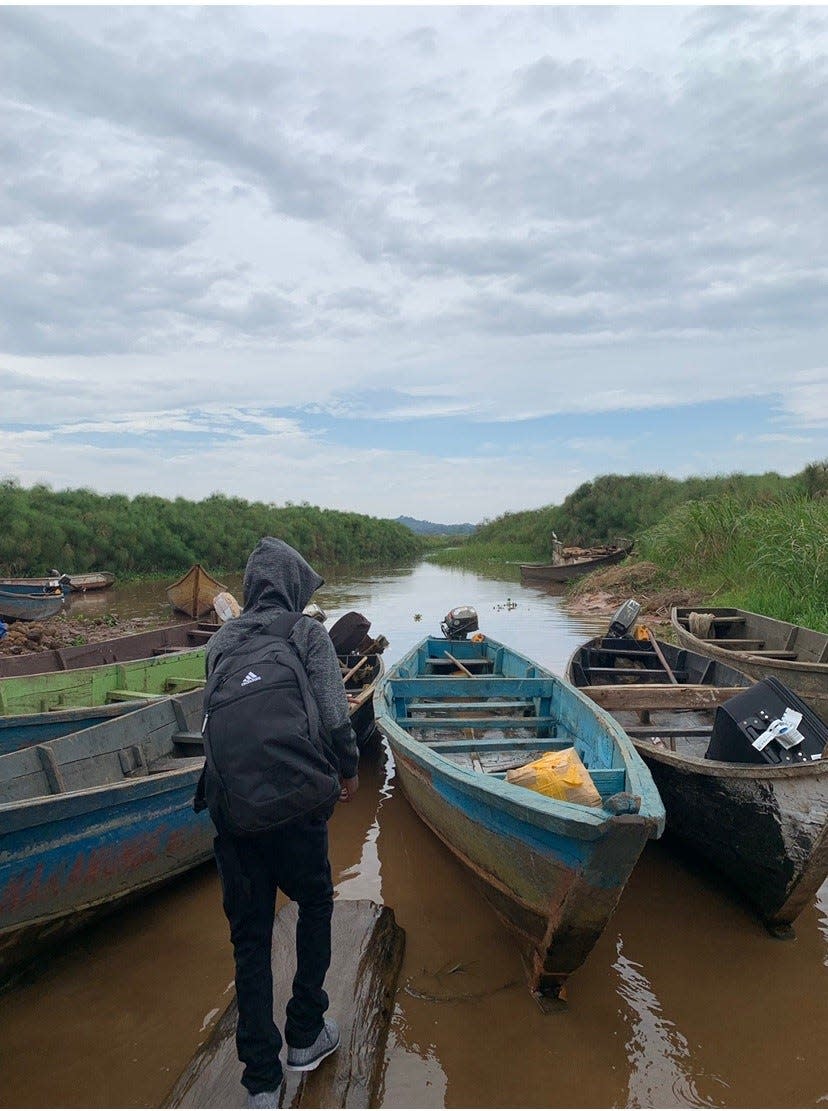
When Jennifer Gerth and her husband adopted Charles through a Texas-based agency in 2015, she never imagined things would turn out this way. That her son’s adoption would be mired in allegations of fraud. That his biological mother would want him home. That Charles would feel as though he’d been stolen.
The family had endured years of emotional and logistical turmoil to get to this flight.
“Inside, my heart is broken,” Charles had told USA TODAY in 2020, almost two years earlier. “My thing is just to be with my family. That’s all I want: to see my brother and sisters. That’s my dream.”
Gerth had contacted everyone she could think of – the State Department, the FBI, her congresswoman and adoption officials – but she said no one would help her make Charles’ dream a reality.
So it had come to this.
‘They were just surviving’
Richard and Jennifer Gerth became interested in adoption after volunteering at an orphanage during a mission trip to Haiti.
“We saw that children were being fed and housed, but they were not thriving,” Jennifer Gerth said. “They were just surviving.”
Estimates vary widely of how many kids live in orphanages or other institutions across the world, but they reach into the millions. A majority are not orphans in the traditional sense of the word: They have at least one living parent, if not two. Often their families are poor, and institutions offer access to food, shelter and education.
Only a fraction of those children become eligible for intercountry adoption. Under the Hague Convention, countries are supposed to prioritize efforts to allow children to grow up with their parents or relatives or, if that isn’t possible, seek to place them with a permanent family in their own country. When those options aren’t available, officials may consider adoptions by foreigners.
Thousands of children are adopted internationally each year, nearly half of them by American families, according to data compiled by Peter Selman, a retired academic and visiting fellow at Newcastle University. The number of intercountry adoptions has dropped over the past two decades, from nearly 45,500 in 2004 to about 6,500 in 2019 – and even further during the pandemic.
Numerous factors have contributed to that decline, including stricter regulations and the reduction or suspension of adoptions from countries like Russia, China and Guatemala.
‘You love this country, and it’s taken': Adoption doesn’t guarantee US citizenship
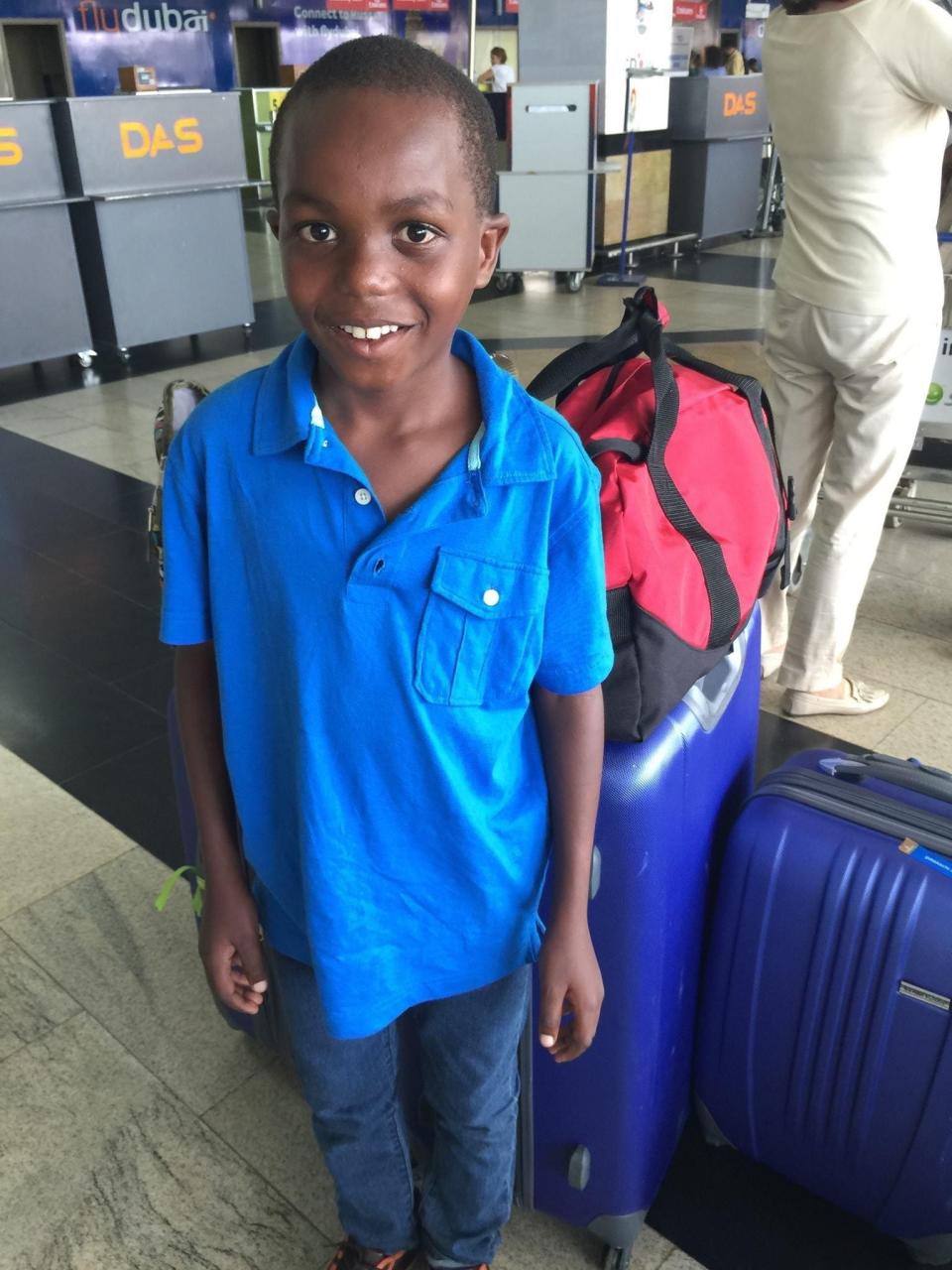
The Gerths wanted to help a child in need. The Florida couple, who had two biological children still at home, couldn’t adopt in Haiti because, at 50, Richard Gerth exceeded the age restrictions there. So they researched other countries with large numbers of waiting children. There were allegations of corruption in Ethiopia, but Uganda seemed to be a safe bet. Or so they believed.
Jennifer Gerth said none of the adoption agencies in Florida facilitated Ugandan adoptions, so in July 2013 they joined Little Miracles International, an agency based in Amarillo, Texas, that promised to “be with you and assist you and cry with you and laugh with you and celebrate with you when you are a forever family.”
Nearly two years later, the agency introduced them to Charles. When they met him at a children’s home in Uganda, he was tiny, with close-cropped hair and a bright smile.
Adoption officials said that Charles was 7 years old and that his biological mother could not be found, Jennifer Gerth told USA TODAY in 2020. His biological father signed off on the adoption.
Charles, who had a limited grasp of English, didn’t understand what was happening. “I thought they were stealing me,” he would later say.
In Luganda, his native language, he said officials warned him to be quiet.
The Gerths became Charles’ legal guardians on May 14, 2015, and then brought him to the United States. His adoption became final 4½ months later.
At first, Charles treated life in the U.S. like a vacation or adventure. He gravitated toward his bubbly new sister and showed interest in Legos, trains and whatever else his new brother was into. He loved drawing and riding his bike.
Charles was also obsessed with food, Jennifer Gerth said. On his first day of school, he disappeared after getting off the bus, only to be found in the cafeteria wheedling some extra food out of the staff. School was challenging for him. He had difficulty sitting still and following directions.
From the beginning, Gerth said, Charles seemed angry and defiant. The family signed up for individual and family therapy to help him adjust, and Richard and Jennifer Gerth took classes about supporting children who had experienced trauma. They transferred Charles to an elementary school more willing to accommodate his needs.
In 2017, Richard Gerth died unexpectedly of a heart attack. That loss seemed to trigger Charles’ past trauma. He told a therapist that he had suffered abuse in the Ugandan orphanage.
The following year, the family’s pediatrician noticed Charles’ listed age didn’t seem to match his body’s development and recommended a bone age study and X-ray, according to court records and documents provided by the family. The analysis indicated Charles was at least four years older than the family had been led to believe. By then, he towered over his classmates.
He was a teenager – 14, not 10.
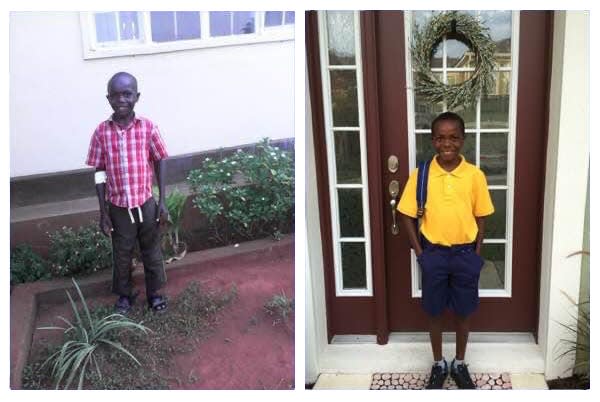
Charles said it was a difficult, confusing time.
School officials moved him from third grade into seventh grade at an alternative school, where he could be around students closer to his own age, education records show. The transition was rough. He was used to being with younger children and continued to struggle with language and comprehension.
Jennifer Gerth explored placing Charles in a boarding school in Uganda that incorporated learning with music, which Charles loved. She said his biological father initially agreed to house Charles during school breaks. Gerth went as far as to fly with Charles to Uganda in late 2018.
The effort fell apart, she said, when Charles’ biological father backed out of their agreement and the U.S. government warned Gerth that it would report her to child welfare officials in Florida if she didn’t take Charles home with her – putting her at risk of losing custody of her other two children.
They returned to the U.S.
In therapy, Charles had spoken frequently about his biological mother. So Gerth hired a private investigator in Uganda to search for the woman listed as “Sarah” on Charles’ birth certificate.
When the investigator found his mother – Faridah Buringi – in June 2019, she said she had not consented to Charles’ adoption. USA TODAY could not reach Buringi for comment. Gerth said they also learned through the investigator that Charles’ biological father had lied before the adoption when he said he didn’t know how to find Buringi.
While on paper Charles was Gerth’s son, his mother wanted to see him and Charles wanted to go home. He told USA TODAY that he hated life in the United States.
“I don’t belong here,” Charles said. “I belong where I’m supposed to be, and this is not my home.”
His attitude got worse, Gerth said. He broke two iPads and made holes in his bedroom walls. He deliberately ruined a pair of shoes so he could get new ones. He manipulated people into trying to donate clothes and shoes to him.
Charles was also obstinate, Gerth said, mocking her when she tried to reprimand him for his behavior.
After several instances of Gerth waking up to Charles touching her chest inappropriately in the early morning hours, she said she installed locks on everyone’s bedroom doors and a camera in Charles’ room and the main area to keep an eye on him. Gerth said she never locked him in his room, but she wanted to make sure she and everyone else in the home felt safe.
“There was no peace, there was no harmony,” Gerth said. “There was always eggshells because you didn’t know what he was going to do.”
At the same time, Gerth felt guilty about having adopted Charles. She said she and her late husband “didn’t go into adoption to take anybody’s child.”
“I need to fix this error that we were not aware of,” Gerth said. “I need to make it right for him, because he’s not happy here, and I can’t blame him.”
Gerth and Charles were united in their grief over what had happened. During an emotional interview with USA TODAY, Charles cried silently, staring at his lap as his adoptive mother described their efforts to rectify the situation. “We’re not going to stop,” Gerth said, rubbing her son’s shoulder as she fought her own tears.
She made Charles a promise: I’ll do whatever I can to get you back to your mom. In truth, she also was ready for him to go.
Counting failure
Gerth wondered how many other people were navigating similar trials.
A recent survey by the National Council for Adoption found the vast majority of respondents who adopted internationally reported that their experience was rewarding and satisfying. The articles Gerth saw about adoption were overwhelmingly positive too, detailing the joyous connection of children and families. They were beautiful stories, but they weren’t hers.
Gerth also faced pushback from some family and friends who believed Charles had a good life and should remain in the U.S.
She felt very alone.
No one knows how many international adoptions break down. A USA TODAY investigation found that at least 66,000 children from all types of adoptions ended up in the foster care system between 2008 and 2020. For more than 60% of those adoptees, reported reasons included the child’s disability or behavioral problem, the parents’ abandonment or relinquishment of the child, or the family’s general inability to cope.
Federal law requires states to collect and report information about intercountry adoptees who end up in foster care, but the data is spotty. Several states indicated they did not have a mechanism to track it, according to the Annual Report on Intercountry Adoption.
Federal regulation also requires international adoption agencies to report disrupted adoptions among their clientele, but that is limited to what agencies are made aware of. The executive director of one adoption agency asked federal officials in 2019 if agencies should report any time they hear from a family in crisis or only those who specifically mention disrupting or dissolving an adoption.
“We get MANY of these calls,” the director wrote, “with a minimal percentage of them ending in a dissolution.”
The full scope of adoption failure is further obscured by problems that occur outside the government’s purview. Some children are placed into residential facilities, informally move in with other families, return to their birth country or become abandoned, homeless or trafficked. Others are privately re-adopted.
At least 130 children adopted internationally have been listed as available for private re-adoption in recent years, according to a USA TODAY review of profiles by Wasatch International Adoptions, a Utah-based agency.
In one listing, the agency sought a new family for an 11-year-old boy adopted from the Democratic Republic of Congo who likes Legos and helping cook. His adoptive parents, who have eight other children, said he hadn’t bonded with them and is “just a visitor in their home.”
Another post spotlighted an active 10-year-old who is grieving the recent death of his adoptive father, with whom he shared a close bond. The family “has been struggling through grief and trying to find a ‘new’ normal,” according to his profile. The boy, adopted internationally, had difficulty connecting with his adoptive mother and would do best with “a strong male influence in his life.”
A third described an easygoing 6-year-old who loves playing on the swings, listening to music and putting her hands under the faucet during her bath. The family said they did not learn the extent of the little girl’s needs until they traveled internationally to adopt her.
Yeshi Vaughan had been in the United States for only about two years when her adoptive parents told her to pack up her clothes so they could take her to a youth shelter. She was 16.
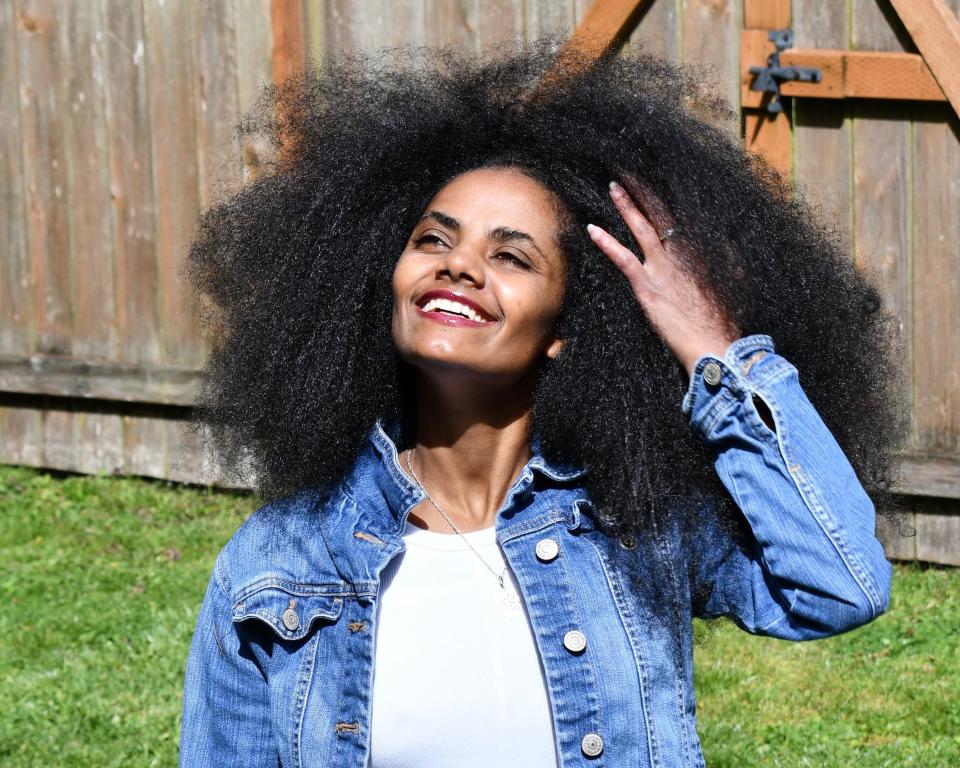
Vaughan, adopted from Ethiopia in 2009, told USA TODAY her first years in the U.S. were immensely challenging as she tried to acclimate to a new culture and language. The teen found it hard to make friends and communicate at home and school. When she entered the shelter – and then foster care – Vaughan said her English skills were a three on a scale of one to 10. She had no interpreter, no way to communicate her feelings.
Now 27, Vaughan was adopted again, but she said the pain of her first adoption experience lingers. She believes the government should conduct visits with intercountry adoptees after they are brought to the U.S., just as it does for children in foster care.
“I’m not alone. There’s other people probably behind the door like me,” Vaughan said. “Nobody’s heard their voice.”
‘False pretenses’
For two years, Gerth dedicated herself to reuniting Charles with his Ugandan family.
She tried to work through the system. She went to court to correct his official date of birth and then filed paperwork to update his passport. She contacted adoption attorneys. She kept in contact with his biological mother, Buringi, and sent money to help support the family.
Gerth reached out to the State Department for help getting Charles home to Uganda. The federal agency oversees intercountry adoptions and handles foreign policy issues, including negotiating treaties and agreements.
She was furious about how the adoption through Little Miracles had been handled. She believed she’d been misled about Charles’ age, his abuse history and his biological mother.
Gerth said she filed a complaint with the Intercountry Adoption Accreditation and Maintenance Entity, a nonprofit designated by the federal government to accredit international adoption agencies.
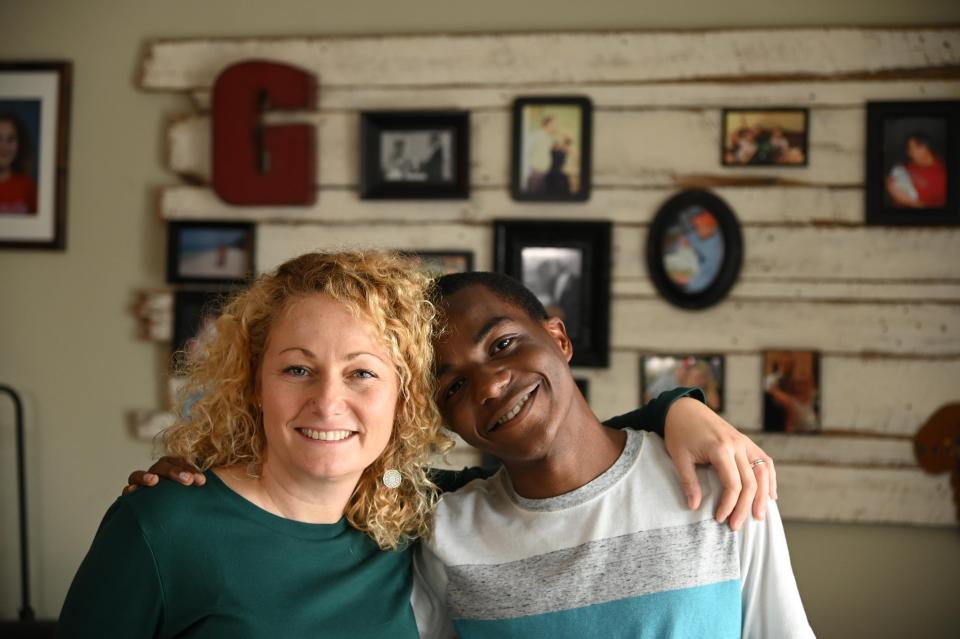
In August 2020, the nonprofit suspended Little Miracles for “failing to maintain substantial compliance with accreditation standards,” according to the State Department.
Stefanie Eye, a senior adviser in the State Department’s Office of Children’s Issues, told Gerth via email that the suspension was in part due to the agency’s “failure to comply with applicable home study requirements, and failure to conduct adoption services ethically and in the best interest of children.” It is unclear whether the suspension was related to Gerth’s complaint.
Two months later, Little Miracles voluntarily relinquished its accreditation. Today, the agency said it offers only humanitarian aid.
Gerth pursued legal action against Little Miracles in 2019, accusing it of negligence, court records show. The agency settled for $115,000.
Attorney Russ Schell, who represented Little Miracles in the lawsuit, said his experience with adoption is that some adoptive families may have a “sub-optimal” fit and go through “unexpected discord and perception the adoptive family relationship has an untenable trajectory.”
“Unfortunately, in such situations some parents, motivated by guilt and externalizing, resort to civil damages actions which ultimately damage the salutary purposes of a well-functioning adoption system,” Schell said in a statement.
Gerth also contacted the FBI after learning that it was investigating Dorah Mirembe, a Ugandan attorney involved in Charles’ adoption. She said no one ever responded.
Mirembe and two other women were charged in 2020 in federal court in Ohio and accused of operating a crooked adoption scheme. Prosecutors alleged that the women paid bribes and took children from their home countries in Uganda and Poland without properly determining whether they were orphaned.
Mirembe and one of the other women faced felony charges, including money laundering and conspiracy to commit mail and wire fraud, federal court records show. The third woman faced charges of making false statements and conspiracy to defraud the United States.
“The defendants sought to profit from their alleged criminal activity at the expense of families and vulnerable children,” Acting Assistant Attorney General Brian Rabbitt, of the Justice Department’s Criminal Division, said in a news release announcing the charges.
Mirembe remains a fugitive, Daniel Ball, spokesman for the U.S. attorney’s office in northern Ohio, told USA TODAY on Dec. 21.
In some cases, her law firm targeted families in remote villages “to manipulate parents – who often could not read or write English – into giving their children up for adoption under false pretenses,” according to the Treasury Department, which imposed sanctions on Mirembe, her husband and two judges in Uganda for their involvement in the adoption scam.
The families believed their children were being looked after by missionaries while receiving an education in Kampala. Instead, the kids were offered to U.S. families for adoption.
Court records indicate Mirembe and one adoption agency, European Adoption Consultants, facilitated the adoptions of more than 30 children between 2013 and 2016. Some children were returned to their biological mothers in Uganda, according to the indictment, after the adoptive parents “came to believe that these birth mothers had not knowingly given their children up for adoption.”
‘So sorry that you got duped’
Gerth’s efforts to secure the U.S. government’s assistance in returning Charles to his mother in Uganda continued to stall.
“Is anyone from State Dept going to actually help us Adoptive parents to return our kids to their birth parents or is this going to be crickets again??” she wrote Eye, the senior adviser for the State Department’s Office of Children’s Issues, in August 2020.
She and Eye spoke on the phone and exchanged several emails, records provided by the family show.
In 2021, she reached out to Eye again, seeking a contact person at the accreditation entity. “I am trying to undo the wrongful adoption and I would like to speak to this department as to my intent to do so,” Gerth wrote.
She said the government treated her like she was a nuisance.
“It was like I was a bother,” Gerth said. “I was annoying them. Like, ‘This is your situation now. So sorry that you got duped, but oh well.’”
The State Department declined USA TODAY’s request to interview officials about Charles’ case, citing “privacy considerations.”
In general, Special Advisor for Children’s Issues Michelle Bernier-Toth said the agency considers several factors when deciding whether to approve a child’s return to their home country, including “the extent to which a competent U.S. state authority such as a court may have determined the return to be in the child’s best interests and whether the adoption authority in the country of origin is prepared to care for the child’s needs.” The child’s home country must also approve the return.
“These requests are extremely rare,” Bernier-Toth told USA TODAY in an email Dec. 16.
Last September, in a joint statement, the United Nations’ Committee on the Rights of the Child, Committee on Enforced Disappearances and other experts said countries have a duty to prevent and remedy illicit adoptions, including providing victims the ability to annul an adoption and finding that victims have a right to reparations.
Indiana residents Barry and Tammy Martin have pushed for justice for themselves and other families after their lives were upended when one of the boys they adopted from China raped his younger brothers. After the teen’s actions came to light, the family learned that he had been a victim of sex trafficking while living in China and had abused other boys.
The Martins filed complaints in court and with the U.S. government alleging negligence and fraud by CCAI, their adoption agency. They said they weren’t fully informed of the backgrounds of two of the three boys they adopted from China.
The accreditation entity suspended CCAI for two weeks in 2018 and then in 2019 ordered the adoption agency to temporarily cease operations in China, State Department records show. Today, the agency is back in good standing.
Tammy Martin told USA TODAY that her complaints prompted an investigation into abuse and trafficking in their son’s orphanage and hotels. She said officials told her they could not take her son back to China because he is a U.S. citizen but that Chinese authorities would assist him if he wanted to return after turning 18.
The teen, who admitted in court to battery, was sent to a residential treatment facility for juvenile sex offenders before moving into a group home.
To help their youngest sons heal, the Martins moved out of the home where the abuse occurred. They spent sleepless nights trying to assuage their sons’ fears they’d be hurt again. One of the boys battles anxiety and has spoken of suicide. Tammy Martin said they’ve struggled to find resources in the community for him.
The Martins’ 31-year marriage didn’t survive the strain. They divorced in 2021.
Tammy Martin said she is happy she adopted her youngest sons from China, but the effects of the oldest boy’s adoption “broke us in every way.” She said the horrific trauma and abuse her family experienced was avoidable, and she has worked to bring light to the situation and to prevent it from happening to others.
“What happened to my family is happening to other families,” Tammy Martin said. “Good people with loving intentions have their lives devastated.”
David and Desiree Smolin began to track problems in international adoptions after wondering if their own situation was an anomaly. The couple had adopted two preteen girls from India in 1998, only to learn their daughters’ biological parents had not consented to the adoption.
David Smolin said neither the adoption agency nor the U.S. or Indian governments would investigate or help them, so they worked with an Indian activist who found the girls’ family and helped them reconnect.
Smolin, a law professor and director of the Center for Children, Law and Ethics at Samford University, said he noticed a pattern in some developing countries: International adoption begins, money funnels in, the number of adoptions skyrockets, bad practices lead to scandals and scandals lead to a moratorium or shutdown. Sometimes adoptions start up again; Sometimes they don’t.
Smolin said that process has played out again and again – in Guatemala, in Ethiopia, in the Democratic Republic of Congo. And in Uganda, where the Gerths adopted Charles.
To prevent fraud, he said the government must hold U.S. agencies accountable for misconduct that happens in other countries. He said it must also curb the flow of money in international adoptions.
Susan Jacobs, a former special adviser for children’s issues who worked in various roles for the State Department for 43 years, agreed. She recalled a minister in the Democratic Republic of Congo wearing a $10,000 watch and $10,000 suit as he offered visitors expensive bottles of champagne.
She said agencies should try to understand a country’s culture and customs before facilitating adoptions there. Sometimes, she added, it’s about asking the right questions. In Haiti, Jacobs said workers had requested several new cars when it turned out what they really needed was gas.
Jacobs said it is also imperative that safeguards – such as a quality home study, confirmation that a child is available for adoption and, if warranted, an investigation – happen at the front end of the adoption process.
“There have been cases where children have been returned to their families,” she said. “I think it’s very difficult, though. I think that once it’s done, it’s done.”
Thank you for bringing my son home
Gerth and Charles often discussed his desire to move back to Uganda. She said she didn’t try to talk him out of it, but she wanted to make sure he understood his choice. His mother lived in a relatively remote area. Charles would no longer have his own bedroom, air conditioning, access to wireless internet or the other things he’d grown accustomed to.
She needed him to grasp that she couldn’t afford to bring him back if he changed his mind. If he truly wanted this, it would be for good. The teen never wavered.
In October 2021, days after receiving Charles’ updated passport with his new date of birth, Gerth booked two plane tickets to Uganda.
“Finally! Finally!” Charles shouted, jumping up and down. He tossed everything he owned – clothes, electronics, art supplies – into four suitcases.
As the plane took off, Gerth couldn’t help but second-guess herself. Charles was 17, and he had lived in their home for more than six years.
“He wants this, and I’m trying to listen to what he wants,” Gerth said. “Yet in my mind, you know, he’s still a child and that’s why there’s adults in charge of children. … You have to guide them. You have to tell them what’s in their best interest, even when they don’t sometimes like it or agree with you. It’s tough love.”
They arrived early in the morning and, after a brief stop in a hotel in Entebbe to rest and freshen up, they boarded wooden boats to take them to the island where Charles’ mother lived. Charles almost vibrated with excitement, chattering about memories with his mom.
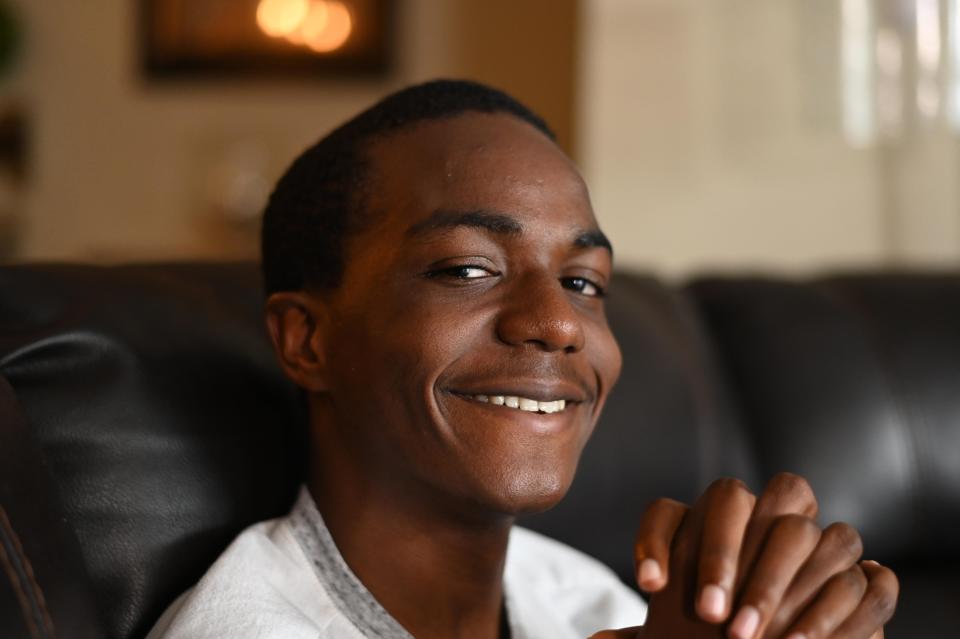
“I think if he had the option to swim across, he would’ve gone because everything was taking too long for him,” Gerth recalled.
When they arrived at the island, people on motorbikes transported them and their luggage.
Gerth remembers Buringi, in a long yellow dress and flat sandals, running toward her son. He was still on the bike, his black Adidas backpack slung over his shoulder, when she reached him. Buringi scooped Charles into a hug, his feet lifting off the ground. She couldn’t stop touching him, his arm, his waist.
She presented Charles to his sisters. Then Buringi hugged and greeted Gerth, who had held back, watching the reunion.
There was such joy. Gerth hadn’t seen Charles smile like that in a long time.
Thank you for bringing my son home, she remembers Buringi saying in halting English.
‘I’m walking away’
Gerth, Charles and Faridah talked for hours, the private investigator who had found Buringi helping translate between English and Luganda. Charles stared at his mother, watching her every move.
“We look so much alike,” Gerth recalls him saying.
Their facial expressions, their posture, even their mannerisms mirrored each other. Watching them together, Gerth felt sure she had made the right decision.
This is what we want to see in him, she thought. We want to see him flourish.
Gerth offered Buringi tips on calming Charles down when he got upset. She felt awkward doing it, as if she were giving instructions to a babysitter. Gerth said she didn’t want to be disrespectful, but she wanted the family to have a smooth transition and be set up for success.
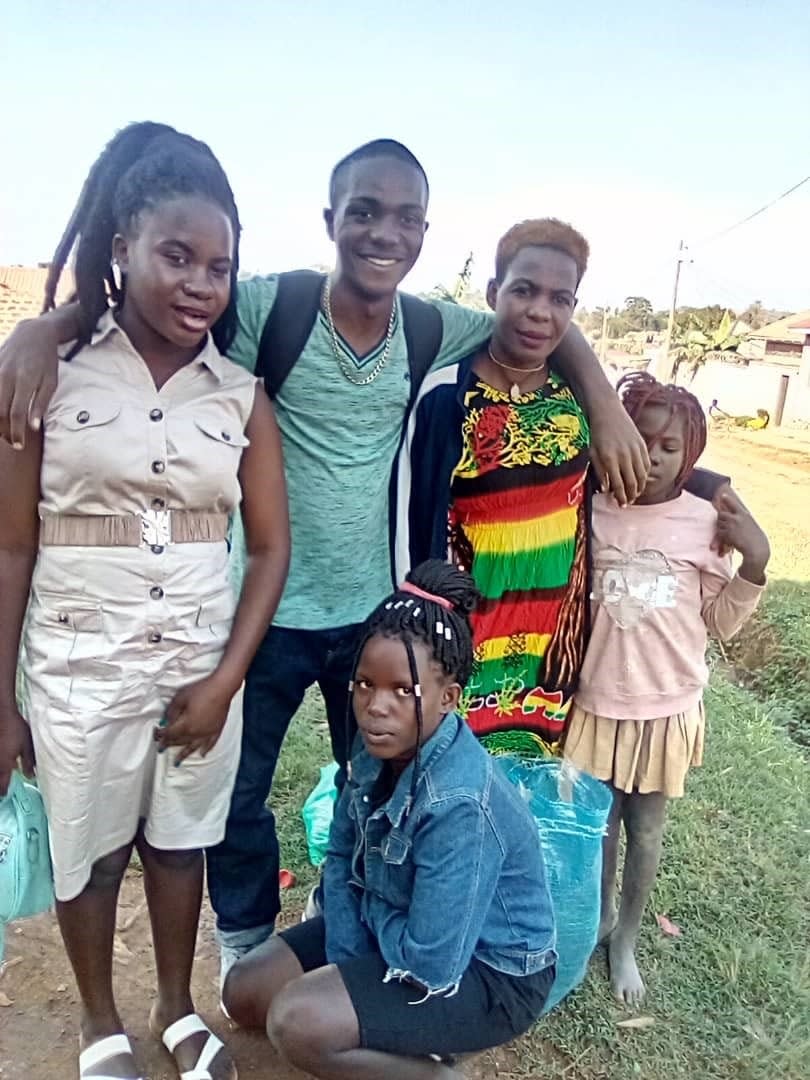
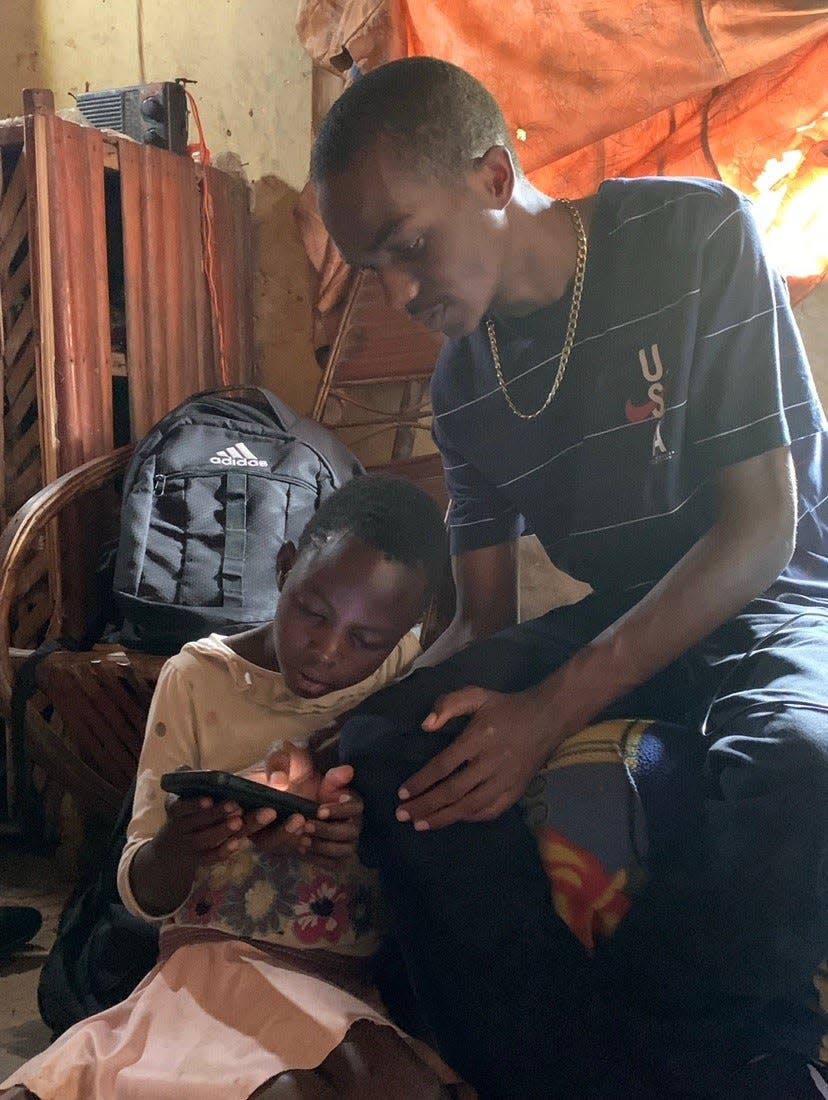
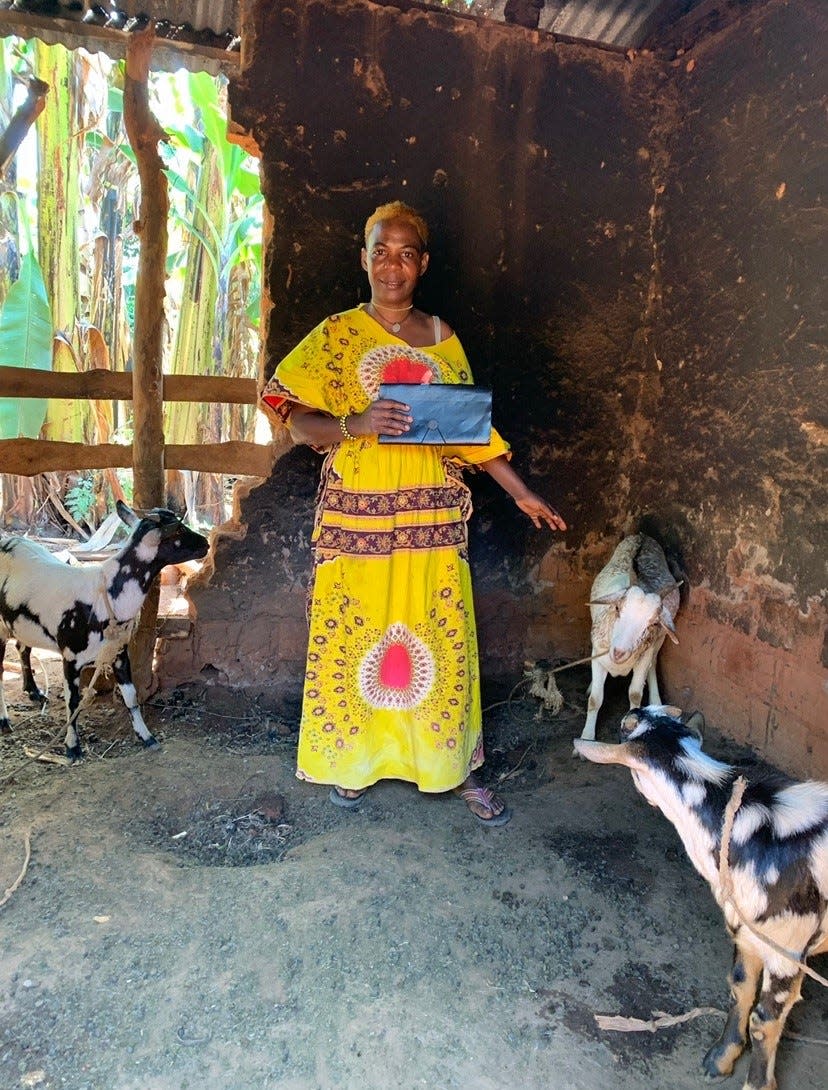
She wondered if Charles would change his mind – if he’d see the tight quarters and the shared bedroom, feel the lack of air conditioning and say, “Take me back.”
Instead, he seemed comfortable and happy. He showed off his anime drawings. When Gerth told him it was time for her to leave, he wrapped her in a hug and said, “Thank you, Miss Jenn.”
She would never be “Mom” to him again.
Gerth left Charles laughing and playing cards with a group of boys who lived nearby. She moved toward the dock, her steps slow and heart heavy. She felt dizzy, as if she couldn’t catch her breath.
She said she was caught off-guard by her own reaction. They’d been planning this for a long time, and the past few months with Charles in the U.S. had felt like a “living nightmare.” Gerth thought she’d be ready to let him go.
“I’m walking away from a child that I’ve had in my possession and raised for six years,” she said. “This doesn’t feel normal. Like, this feels abnormal.”
Buringi walked Gerth and the translator partway back to the boat. Gerth willed herself not to cry as Buringi said thank you, but tears streaked her cheeks as the boat pulled out.
The next day, Gerth stared out the airplane window at takeoff. It’s done.
Or so she thought.
‘Congrats you have been played’
Over the next year, it seemed as though Charles was settling into life in Uganda. He enrolled in a mechanics school. Gerth, who paid for Charles’ tuition and groceries, arranged for a woman to check in on him to make sure he had everything he needed.
Back in the United States, Gerth and her children were finding their way to a new normal. Charles returning to Uganda was a relief, she said. The family no longer had to lock their doors. The cameras were disabled.
In the fall, though, things began to change. Charles went missing, and Gerth would learn he had been in touch with the U.S. Embassy in Kampala, Uganda.
She received a phone call from Consular Sally Sternal, who said Charles had been found on the streets of Kampala.
SUBSCRIBE: Help support quality journalism like this.
“We were worried that you were worried about him,” Gerth said Sternal told her. The State Department declined USA TODAY’s request to interview Sternal or any other official about Charles’ case.
Gerth said she explained that Charles had been in school, and that she’d been covering his tuition, room and food.
“You do know you’re talking about a grown man?” she asked.
She said Sternal replied that she hadn’t seen his documentation yet, so Gerth pointed the U.S. official toward Charles’ biological parents. Gerth followed up to provide their addresses and phone numbers.
She said that was the last she heard from anyone at the embassy.
On Sept. 25, Gerth received a Facebook message from a man who said he’d heard about her through Charles.
Screenshots of the conversation show the man said the U.S. Embassy had brought Charles to the man’s charity organization while the government processed documents for his return to the U.S.
Charles would be leaving that night, the man wrote.
“I want to thank you for the love and care you gave to Charles because people like you are very few in this world,” the man said, “may God bless you please.”
The man used a different last name for Charles, but photos that accompanied the message showed it was him – grinning, posing with other young people and hanging out in a swimming pool.
The situation reminded Gerth of when Charles used to manipulate people into giving him cafeteria food, clothes or shoes back in Florida. She fired off a message reiterating that Charles had been in a mechanics program, not living on the street. She said he was not welcome back in their home.
“Congrats you have been played,” she wrote.
The man apologized and said he would speak to the embassy. He later told Gerth that Charles had returned to his mother in Uganda, who in turn said Charles went to live with an aunt.
USA TODAY could not verify Charles’ current whereabouts.
The media outlet reached out via Facebook messenger in November to ask the man from the nonprofit for an update on Charles. The man reiterated that Charles had returned to his mother.
“We are no longer with Charles,” he wrote, “please we have a lot to handle.”
Marisa Kwiatkowski is a reporter on the USA TODAY investigations team, focusing primarily on children and social services. Contact her at mkwiatko@usatoday.com, @byMarisaK or by phone, Signal or WhatsApp at (317) 207-2855.
Explore this series
‘A broken system’ leaves tens of thousands of adoptees without families, homes
This article originally appeared on USA TODAY: One boy’s quest shows international adoptions can have a hurtful side

